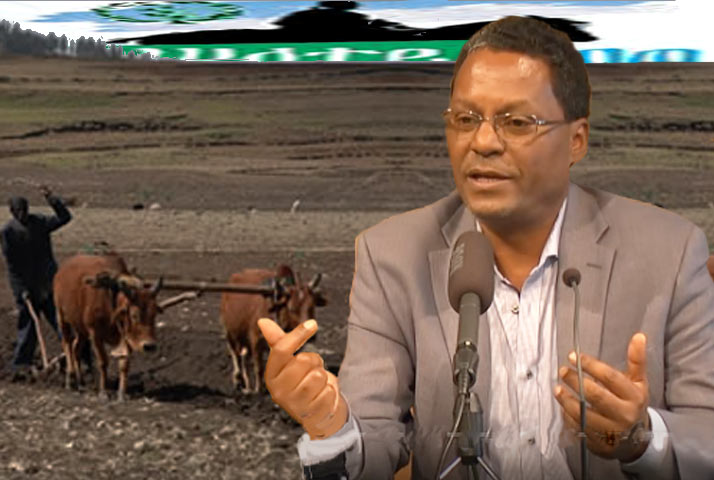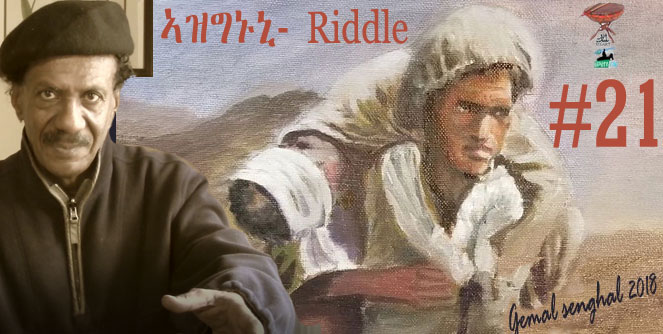Territorial Integrity v. Human Dignity

The motivation for this article culminates from the ongoing intense discussion that continues to precipitate based on the talk that Dr. Bereket Berhane1 (henceforth referred to as Dr. BB) gave about his firsthand experience from working at the border between Eritrea and Ethiopia as a medical doctor. Dr. BB provides ample context for his talk… Gives somewhat detailed background of the Eritrean youth movement that coincided with the Arab spring…Mentions the Debre Zeiti gatherings and the 2008 California EYC movement… so on and so forth. Interestingly, at the outset, Dr. BB states that change requires sacrifice, time, capacity… and it is time consuming he says as he commends the individual who singlehandedly made the talk happen. In this paper, I am going to use Critical Discourse Analysis (CDA) to hone into Dr. BB’s talk translating it into English text, thereafter analyzing it. This undertaking, thank goodness did not go beyond the first several minutes of the talk. In the nick of time, Dr. BB promised to write an article in several days that would clarify his position. I must admit, this came as a big sigh of relief for me because to do CDA is labor intensive enough without translating the talk from Tigrinya to English. I would’ve had to do textual and contextual analysis frame-by-frame, which would’ve amounted thirty-to-forty pages of work. Now that I don’t have to do that as Dr. BB will give us all the needed context for his talk, suffice it to mention CDA can be extremely helpful when analyzing the work of individuals, be it a written text or the spoken word with visual medium to boot. So, CDA will have to be saved for some future endeavor when the right time calls for it.
I will venture, however, to write in today’s piece on my overall impression of the state of our opposition camp, which is fraught with so much angst that one doesn’t even know where to begin, but beginning one must. Perhaps continuing where Dawit Mesfin’s2 article, “All About Self-Liberation”, left off might as well be a good starting point for those of us who profess to belong to the opposition camp. Transcending the notion of “self-liberation” via “self-awareness…[and] the need to possess moral virtues, grow out of our objectionable nature”, requires us to deeply consider certain habits of mind; habits of mind that we have been accustomed to promulgating as though it was part of our characteristic way of arguing and counter arguing. How can one claim to be liberated if one cannot even admit to past mistakes? How can we claim to possess any “moral virtues” when we are incapable of speaking against Eritrean officials who happen to share the same DNA as we do, who served the menace at home? And, we don’t even find it contradiction in terms when accusing others? How can one have any credibility left if one’s political party is defined based on his/her region or vice versa? Guess who’s a master at that – Right you are: The menace at homeland. How can one refuse to denounce one’s siblings who advocate for agazian’s hateful campaigns or one’s family members who continue to uphold extreme religious viewpoints that are a notch or two below that of Al Qaeeda or ISIS or Boko Haram or al Shabab. We need to really do some serious soul searching before we begin accusing others of unpatriotic tendencies.
It is because of the above untenable positions that I continue to find exasperating when we intensely focus on territorial integrity amidst the existential threat we are facing, where our young are vanishing to the world at large. This to me is akin to focusing on carts, tents, and litters on skid row (the homeless quarter) of downtown Los Angeles, instead of the people who inhabit the unseemly place. Dr.BB’s talk is being gutted to whether he is a patriot just because he made an effort of prioritizing matters of extinction of our culture, tradition, and heritage the essence of which is captured powerfully in መሬት ዶ ንቀብሪ ወይ መሰል ንክብሪ? 3 The colossal exodus of our young is triggered by that ultimate human urge for dignity, which continues to be robbed by the regime in power; yet, we wanted to make the subject to be that of a disputed territory writ so large and so analogous to the twgaHmmo catchphrase we’ve seen between 1998 and 2000 border war between Eritrea & Ethiopia. This, to me, reeks to the heights of heaven and absurdity writ to its max, as it were. There is no straw man argument here. What there is is the need for internal reflection and to admit when making a mistake. We are not doing the opposition camp any favors if we cannot admit of falling short sometimes. In fact, it is those of us who seem to want to dance our way out of some of our errant ways of the past without admission that we consider it an art of skilled debate. We are not in a debating society here. This is about generations of young lives becoming part of the wasteland. This is no time for witticism. This is time for standing up to be counted in the direly needed changes back home. The social conditions and social structures as we know them are disappearing in front of our eyes.
The “social conditions” states (Fairclough, p. 19)4 determine the nature of discourse as it becomes unmistakably clear when paying close attention to the way we choose to frame our discourses. Sadly, the framing of this territorial integrity at any cost was coined by the menace at home with our help. It came from the regime sponsored propaganda that goes back to the 1998-2000 with Ethiopia when most of us were doomed into believing we were on the right side of history for standing tall with our country. But, seventeen years hence to stick to our guns and never acknowledging we were wrong when we stood with the regime that outwitted us all is a disservice to our cause. There are individuals who advocated my country right or wrong then and who continue to stick to the territorial integrity argument now even if it comes at the ultimate price of human dignity; even if it comes at the hollowing out of the nation from its vital human source – the youth – is something difficult to fathom.
So then, facetiously characterizing “language” in the aforementioned scenario as nothing more than “a dialect with an army and a navy” is not farfetched because all of the violence and the continued perpetuation of it are mechanized through language vis-a-vis policies, regulations, and propaganda laced in disguise of territorial integrity. Contextualizing language as a “social condition [] specific to a particular historical epoch” is an apt one (Fairclough, p. 21), as that magnifies the notion of how “power is typically exercised not just by the regime at the helm of power, but by an alliance of diaspora’s “Amen Corner” and others to boot, who see their interests tied to the commodities they may possess back home… [such an alliance Fairclough (1992) calls] the dominant bloc” (p. 33).
Beyond the monetary alliances, such dominant blocs exercise their hegemonic power through language so much so that some of us in the opposition who are being oppressed by this blatant hegemonic force – inadvertently or otherwise – not only appropriate such language as intermeshed by ideology but use it as though it was the truth and the fact of life. It is not that difficult to see how ideology could easily collude with having currency in the realms of staying in power to perpetuate the continuation of status quo of the ruling class, in this case, in the name of consent. Dr. BB tells us territory is not our priority, some of us are willing to go gang ho on him as if he were selling that part of the land to Ethiopia much as Russia did of Alaska or the French did of Louisiana.
The Subtlety of Ideology
Fairclough (1992) invokes notions of ideology as borrowed from Gramsci who conceptualizes it “as an ‘implicit philosophy’ in the practical activities of social life, backgrounded and taken for granted, that connects it to ‘common sense’” (p. 84). For the purposes of this piece, however, the preferred conception is the potency of ideology resting in its subtlety and the currency it gains when it operates seamlessly in the asymmetrical power relations that exist in society. As Fairclough (1992) points out that “ideology is most effective when its workings are least visible [because] if one becomes aware … [of] power inequalities” (p. 85) ideology loses its potency. Therefore, recognition of the critical role ideology plays in a society is of great import, because it is through ideology that “various social institutions contribute to sustaining the position of the dominant class” (p. 36). When discourses are interlaced with dominant ideology through various social institutions the outcome will invariably be citizenry ill-informed that easily accepts soundbite explanations on matters of social and political landscapes to the detriment of the society at large. Precisely, Dr. BB’s point about our young’s gullible disposition and whose ideologies are based on copying and pasting, the material of which they have neither the proper understanding of its depth nor its breadth.
Fairclough (1992) asserts further that “…certain key discourse types which embody ideologies which legitimize, more or less directly, existing societal relations, and which are so salient in modern society that they have ‘colonized’ many institutional orders of discourse” (p. 36). The effect of such a colonized mind is so seamless even well-informed writers in our midst fall to the bait of hegemonic forces that the dominant culture bombards the diaspora with, as is evidenced by the strong reaction to Dr. BB’s talk. This talk is, in fact, Exhibit A that shows ever so saliently and ever so seamlessly because many of us refuse to rid ourselves from the 1998-2000 frame of mind to a point of not only inadvertently colluding with the regime and its supporters but we don’t realize that we are pandering and acquiescing to the norms of the regime’s dominant bloc political frame of reference. This, in the parlance of Fairclough (1992), is “…ideology and the exercise of power by consent as opposed to coercion” [as he expounds further by stating that] this is often a matter of integrating people into apparatuses of control which they come to feel themselves to be a part of” (p. 36).
Obviously, this salient and seamless acquiescence and pandering does not occur in vacuum. There is an inherent dialectical process that helps in the shaping of the discourse as “…control over orders of discourse by institutional and societal power-holders is one factor in the maintenance of their power” as was suggested earlier, the notion of territorial integrity is one apparatus that keeps and sustains the regime in power. Therefore, social and political organizations are perfect antidotes that enhance the perpetuation of status quo. So, the relationship between social “structure” and “social practice” is made to be magnified through the discourses that take place where ideology is its undercurrent and language as the ultimate elixir, the adhesive, if you will, that bind it all together, making for well-oiled machinery that continues to operate with very little hindrances. Such dynamics Fairclough (1992) contextualizes it within “the social world [where] social structures not only determine social practice, they are also a product of social practice” (p. 37).
A thorough understanding of this dynamism is crucially important, especially if our educated lot are going to inculcate criticality in their sociopolitical strategies to defeat the regime at the helm of power that continues to wreak havoc. Power and privilege must be challenged in awate.com like spaces where the seeds of self-liberation need to be sown. These seeds of criticality have components of culture and the psychological makeup that breeds them. Gordon (2014)5 illustrates this notion rather succinctly: “To understand behavior one has to understand it in relation to those social structures that are part of the context in which behavior develops and exists…it is necessary to study human intention and human agency – that is, the actions of humans – as they are mediated by these social structures. To do this requires that we heed context, perspective, and the dialectical interactions specific to the behaviors under study” (p. 313).
All these and more are re-conceptualized in Tappan’s (2006)6 “Reframing internalized oppression and internalized domination: From the psychological to the sociocultural”, in which a step-by-step intellectual journey is meticulously constructed to show why both of the twin concepts of “internalized oppression and internalized domination” ought to be replaced. According to Tappan, the twin concepts, “appropriation of oppression and appropriation of domination” (pp. 2115-2144), have dynamism to them that would give room for growth. If you’ve come this far reading my entry, blessings, but I am way beyond my word-limit here.
References:
- http://assenna.com/voice-of-assenna-london-conference-dr-bereket-berhane-re-trust-building-among-eritrean-youth/
- https://awate.com/all-about-self-liberation/
- መሬት ዶ ንቀብሪ ወይ መሰል ንክብሪ?
- Fairclough, N. (1989). Language and power. London: Longman.
- Gordon DM (2014) The Ecology of Collective Behavior. PLoS Biol 12(3): e1001805. https://doi.org/10.1371/journal.pbio.1001805




Awate Forum